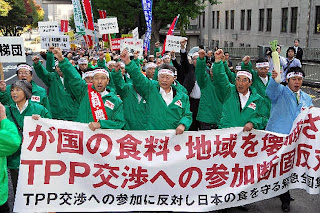Readers of Shanti Phula’s blog must have already
expected this move when the LDP was back in power. Mr. Magosaki says, “I think the people who are
deceived are greatly to be blamed. The government
that deceives the people is definitely bad but the people who are deceived are
foolish.”
Hello, young people! Next time you might be drafted for
service. Are you going to battle
obediently? If you don’t complain about
it, it might be one of possible choices.
Masataoshi
Takeshita
April
14, 2013
Protest marches against TPP by JA(Japan Agricultural Cooperatives) members
photo from bit.ly/15qj532
English translation of a Japanese article: “Honne Iimasse” (I‘ll deliver my true message) – April 14, 2013 -
Abe
Administration Has Neither Will or Ability to Stick to Japan’s Claim
TPP vividly shows the fallacy of the Abe
administration.
The Abe administration
was established nominally with a slogan of anti-TPP.
More than 120 LDP members showed a tough
stance against TPP in the election.
However, the opposition itself was totally
fallacious.
In the House of Representative election,
Mr. Abe had consistently pledged “The LDP would not
participate in any negotiations based on the premise of abolition of tariffs
without exceptions.” He made a
promise only so far. Many Japanese people interpreted this to mean “He would
protect sacred areas” but it’s a serf-serving interpretation.
However, Mr. Abe tactically directs the
people to self-serving interpretation.
This usage of wording is the
technique typical of the Japan’s bureaucracy.
Then Prime Minister Abe declared that the
government would display its negotiating power.
On 15th, Prime
Minister Abe held a press conference and officially pronounced that the country
would participate in the TPP (Trans-Pacific Partnership) negotiations.
He made his decision in the midst of the
pros and cons of the problem. His
political skill of how to protect national interests will be called into
question.
Prime Minister Abe said, “Now is our last
chance. Losing this opportunity would
simply leave Japan out from the rule-making in the world,” “We would protect the areas we should protect and attack the
areas we should attack, using every possible negotiating power. I will pursue the best way to serve Japan’s
national interests.” Listening to his determination, you believe that he will do
his best.
However, they are just words. Then what happened?
“The government announced that Japan and
the U.S. have reached an agreement on prior consultation paving the way for
Japan to participate in TPP negotiations.
In prior consultation, Japan has made concession to the U.S. in the non-tariff measures-related
areas of automobiles and insurances, which the U.S. took an aggressive stance
on, as well as safety standards of food product and has decided to
continue Japan-U.S. consultations in parallel with the TPP negotiations.”
The Asahi Shimbun {web} on 13th
reports:
“The Abe administration, which aims to
participate in the TPP negotiations in July has quickened an agreement, has
made concessions to the U.S. on many areas including a focal issue of
automobiles. Japan is likely to be
forced to pay high ‘admission fee’.”
The Nikkei Shimbun reports:
‘In order to participate in the TPP
negotiations, Japan has been forced to pay admission fee to the U.S.
The Japan-U.S. agreement
clearly reflects the demands of each sector in the U.S.
The U.S. automobile
industry which opposes Japan’s participation has blatantly disclosed its protectionism, which is
completely different to liberalism TPP aims for.
(The timing for phases-out of U.S. tariffs
is maximally protracted.)
What is the response of
the people who raised a slogan of anti-TPP?
As many as 120 LPD members should have been
elected thanks to the slogan of anti-TPP they raised.
Do they still insist on the opposition to
TPP?
How are the farmers who were placed at the
vanguard of anti-TPP doing?
They seem to have made an
about-face change of their attitude and sought for ways to get money from the
government.
What about the Japan
Medical Association? The Association also
seems to become silent.
I’m reading the Sankei Shimbun morning
edition dated April 14 (14th version).
Almost no news on TPP has disappeared in
the newspaper.
An article in the corner of a second-page
titled “Japan-U.S. Agrees on TPP ‘Sense of Danger’” barely reports:
“On 13th, Mr. Goushi Hosono,
Secretary General of Democratic Party of Japan, expressed concern about the
prior consultation between the Japan and U.S. governments over Japan’s
participation in the TPP negotiations, saying “I feel a great sense of
danger. Almost nothing about agriculture
and nothing of medical services have been mentioned.” He told about it in his address of a meeting
held in Mito City.”
Was it expected how it
would go like this?
Yes, highly expected.
Prime Minister Abe gained
power by claiming “to strengthen the Japan-U.S. relationship.”
Nothing but TPP can show his strong
determination.
It means that he has no choice but to swallow
all demands of the U.S.
Follow up how the TPP has gone, you will
understand it.
The government has
consistently used lies and sophistry.
My opinion is that the
people who are deceived are greatly to be blamed.
You can be wise enough not to be taken in
by the government because a lot of information is available.
The people who want to be deceived: I’d
like to think anew about it.
